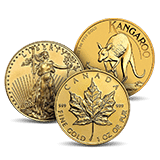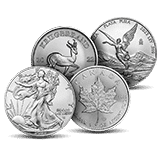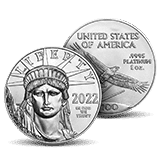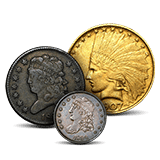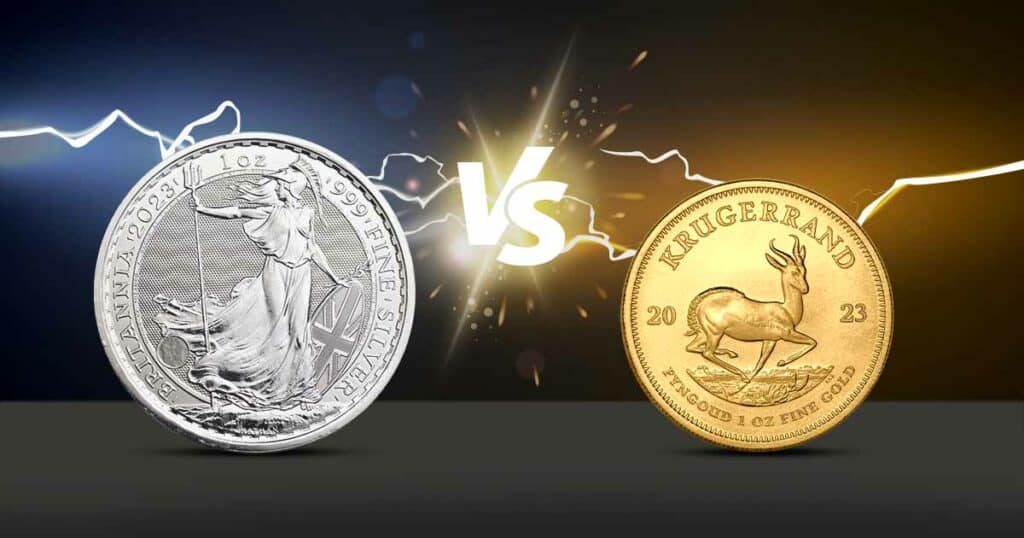
For investors, both Krugerands and Britannias offer reliability and are good stores of gold. The choice between them may depend on personal preference, tax implications, and availability. For those in the UK, the tax benefits of the Britannia may tip the scales in its favor, while the Krugerrand’s global recognizability might be more appealing to international investors.
History of the Krugerrand and Britannia
The Krugerrand and Britannia are two of their countries’ most famous bullion coins. The Krugerrand and the Britannia have played crucial roles in the world’s gold and silver bullion markets. They represent a store of value and cultural and historical symbols of their nations.
Krugerrand
Minted by the South African Mint, the Krugerrand is distinguished as the world’s first gold bullion coin, introduced in 1967. Due to its long history, it is one of the most recognized gold coins globally. For a few years, some countries banned the importing of the Krugerrand in protest of apartheid. The ban was lifted in the U.S. in 1991.
Britannia
Minted by The Royal Mint of the UK, the Britannia was introduced in 1987. While younger than the Krugerrand, it is still widely recognized, especially in Europe and the Commonwealth nations. In part this coin was created to satisfy the market’s need for gold bullion coins when they could not access the Krugerrand.
Gold Purity
Gold purity refers to the amount of gold content in an item relative to other metals or impurities. It is expressed in karats or fineness for bullion.
Krugerrand
The Krugerrand coin is 22 karats or 91.67% gold. The remaining 8.33% is copper, giving it a reddish hue compared to other gold coins. This copper alloy also makes the coin more durable.
Britannia
As of 2013, Britannia coins have a purity of 24 karats, or 99.99% gold, making them among the purest gold coins on the market. Before 2013, they were 22 karats like the Krugerrand.
Coin Design
Coin design refers to the artistic and symbolic representation on a coin’s surface. Since ancient times, coins have been used as a medium of exchange and to convey art, culture, power, and political messages.
Krugerrand
This coin features the likeness of Paul Kruger, the former president of the Republic of South Africa, on one side and the springbok antelope on the other.
Britannia
The Britannia features the iconic image of Britannia, the female embodiment of the British Isles, on one side and Queen Elizabeth II on the obverse. The design of Britannia may change from year to year, which may add collectible appeal.
Legal Tender
Legal tender means that the coin has been assigned a face value that can be used to make purchases. However, the gold content is worth far more than the face value.
Krugerrand
While it is considered legal tender in South Africa, it does not have an assigned denomination.
Britannia
The Britannia is a legal tender in the UK, with its value surpassing its face value, making it impractical for day-to-day transactions.
Availability and Rarity
While some coins have a low mintage and are difficult to obtain, these coins have been mass produced, and you can easily find them on the market.
Krugerrand
Due to its long history, the Krugerrand has many minted coins and can be easily bought and sold worldwide.
Britannia
It is also readily available, though not as globally pervasive as the Krugerrand.
Tax Implications
For many investors, tax implications may influence what they consider investing in. In many countries, you may be required to pay taxes if you sell your gold for a profit. On the other hand, you may also receive a tax benefit if you sell for a loss.
Krugerrand
Tax implications vary by country. In some countries, profits from its sale might be subject to capital gains tax.
Britannia
In the UK, Britannia gold coins are exempt from capital gains tax, making them especially attractive to UK investors.
Krugerrand vs Britannia Overview
This overview compares the specifications of these two coins. We compared the most modern, 1-ounce coin. While these coins differ slightly, they often hold similar value.
| Krugerrand | Britannia | |
| Origination | 1967 | 1987 |
| Purity | .9167 | .9999 (Post 2013) |
| Gold Weight | 31.10 Grams | 34.05 Grams |
| Other Metal | Copper | Silver (Post 1990) |
| Legal Tender | Yes | Yes |
| Availability | Worldwide | Worldwide |
| Tax Implications | Varies | Advantages for UK citizens |
| Mint | South African Mint | The Royal Mint |
| Backer | South African Reserve Bank | British Government |
| 1 oz Denomination | NA | 100 Pounds |
| 1 oz Size Diameter | 32.77 Diameter mm | 32.69 Diameter mm |
| 1 oz Size Weight | 33.93 Grams | 34.05 Grams |
| Other Sizes Available | ½, ¼, and 1/10 oz | 5, ½, ¼, 1/10, 1/20 oz |
Other Modern Gold Bullion Coins to Consider
Other countries who mint gold coins include the American countries like the U.S., Canada, and Mexico. European countries like Switzerland and Austria. Russia, China, and Australia also produce gold coins.
The Canandian Golden Maple is a popular coin as it contains .9999 fine gold. In the U.S, the American Golden Eagle is a favored choice. Besides the Britannia, the Austrian Gold Philharmonic coin is well-received in Europe. The Chinese Gold Panda is one of China’s most significant gold bullion coin exports.
As with all gold coin investments, there are risks. The price of gold can be volatile, and there is no guarantee of return. It is essential to do thorough research and consult with your financial advisor before making significant investment decisions.

